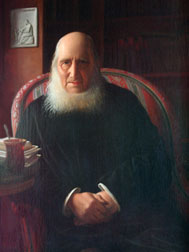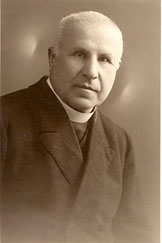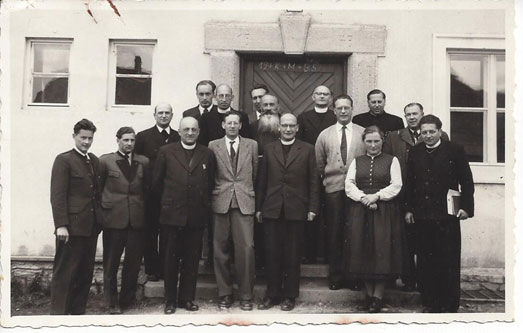60 Years of ARGE Bildungshäuser Österreich
More than 60 years ago, courageous directors of the Catholic "educational homes" set about forming a community. The aim was to help and support each other and to jointly develop financial resources for educational work. This is how the ARGE der Volksbildungsheime Österreichs (Working Group of the Austrian National Education Centres) came into being in 1954. The constituent meeting took place on 23 September 1954 in the Bildungshaus Schloss Grossrussbach.
The founding members were: Catholic Educational Centre Grossrussbach, National Educational Centre Puchberg, National Educational Centre St. Martin, National Educational Centre Retzhof, Catholic Educational Centre Maria Trost, Federal National Educational Centre Graschnitz and Rural Educational Centre Pöckstein. From October of the same year the following institutions joined: Catholic VBH St. Augustin/Lungau, Catholic VBH Schloss Goldegg, Catholic VBH Batschuns, Evangelical Home Volkhochschule Deutschfeistritz, Catholic VBH Forchtenau, VBH St. Michael.
Dr. Hans Wittmann of the VBH Graschnitz was elected as the first chairman and Dr. Martin Stur of the catholic VBH Grossrussbach as his deputy.

The roots of the Bildungshäuser
The history of the Bildungshäuser in Austria began at the beginning of the 20th century. At that time they had a very special mission to fulfil. Many educational homes took over the tradition of home folk high schools following the Danish model. The Danish pedagogue, Nikolaj Frederik Severin Grundtvig, is regarded as the founding father of the idea of folk high schools. As a forerunner of our educational institutions, the idea spread from Denmark via Northern Germany to Austria.
In 1919 Prelate Dr. Josef Steinberger founded the Volksbildungsheim St. Martin near Graz. This was the beginning of a success story for the Bildungshäuser in Austria that continues to this day. From the minutes of the founding meeting of the ARGE Bildungshäuser (ARGE BHÖ), at that time known as "Bildungsheime" (educational homes), the educational goal of the Bildungshäuser can be seen, which is still largely valid today:
"The educational work of the Volksbildungsheim aims at the whole person and the totality of life. The person should be led to free and responsible decisions in the personal, professional and social area.

The motto "education with home advantage" became the trademark of the Bildungshaeuser in the 50s and 60s. By 1972 at the latest, ARGE BHÖ was perceived throughout Austria as an umbrella organisation for adult education. Under the chairmanship of Dr. Josef Gruber from the Bildungshaus Puchberg, with Leo Prüller from the Bildungshaus St. Hippolyt and Hermann Weber from the educational institution Grillhof in Tyrol, the statutes were revised and an association was founded. With the foundation of the Conference of Adult Education Austria (KEBÖ) the ARGE Bildungsheime became an equal member within the Austrian non-profit adult education landscape.
Significant milestones in the past
The exchange of experience and the discussion of educational policy issues were central concerns of the ARGE. Study trips in Europe and the USA provided a view beyond the horizon and brought new impulses for the educational work in the houses.
Since the mid 1980s, the promotion campaign for unemployed teachers for adult education organisations and the campaign for pedagogical staff have led to an upgrading of pedagogical activities within AE organisations.
ARGE Bildungsheime was also a co-initiator of the Television and Radio Prize of Adult Education Austria, an important public presentation of AE on radio and television. With the appointment of Dir. Eduard Ploier from the Bildungshaus Puchberg, to the ORF (Austrian Public TV) Board of Trustees, ARGE BHÖ had a prominent adult educator for many years on the highest ORF committee. The Eduard Ploier Prize, which is awarded annually as part of the Austrian Adult Education Radio Prize for services to adult education in broadcasting, is named after him.
Change of members in the ARGE
Since the foundation of the ARGE, there have always been houses that joined the ARGE BHÖ and left for various reasons. The community consisted of houses with church and non-church sponsorship.
A special break came in 1997 when some of the ecclesiastical houses in the ARGE BHÖ were separated and became the Forum of Catholic Adult Education. In the run-up to this separation, there were intensive discussions on the question of whether or not the church education houses were in good hands with ARGE BHÖ. Points of criticism were the lack of content work and the insufficient financial support from the Ministry of Education.
An alternative was the newly founded Forum of Catholic Adult Education, the collection of all Catholic institutions at the federal level.
After the vote at the plenary assembly of ARGE BHÖ in 1997, 13 Catholic houses switched to the Forum. The ARGE was reduced to 18 educational institutions.
Due to the withdrawal of some of the Catholic educational institutions, the ARGE had to reassess its position. As a smaller organization within the AE associations, it had to reorient itself.
The ARGE BHÖ focused on professionalisation and dealt intensively with quality management. The aim was to ensure and further develop quality in the Bildungshäuser in the long run. However, it was also necessary to adapt the educational content in the houses to changing requirements. Mission statements were modified, new visions and goals were defined. The balancing act between economic necessity and educational policy challenge is still a particular challenge for the educational institutions today. In all this, as always, the human being with his needs is the focus of our considerations. As a professional service organisation, seminars for occupational groups were offered to the employees in the houses and quality management in the houses was supported by quality circles. ARGE BHÖ is also responsible for the business field of "education management" throughout Austria as a supporting organisation within the cooperative system of Austrian adult education.
Ing. Rudolf Planton
Chairmen of ARGE Bildungshäuser Österreich


 Funded by means of Bildungsministerium.
Funded by means of Bildungsministerium.